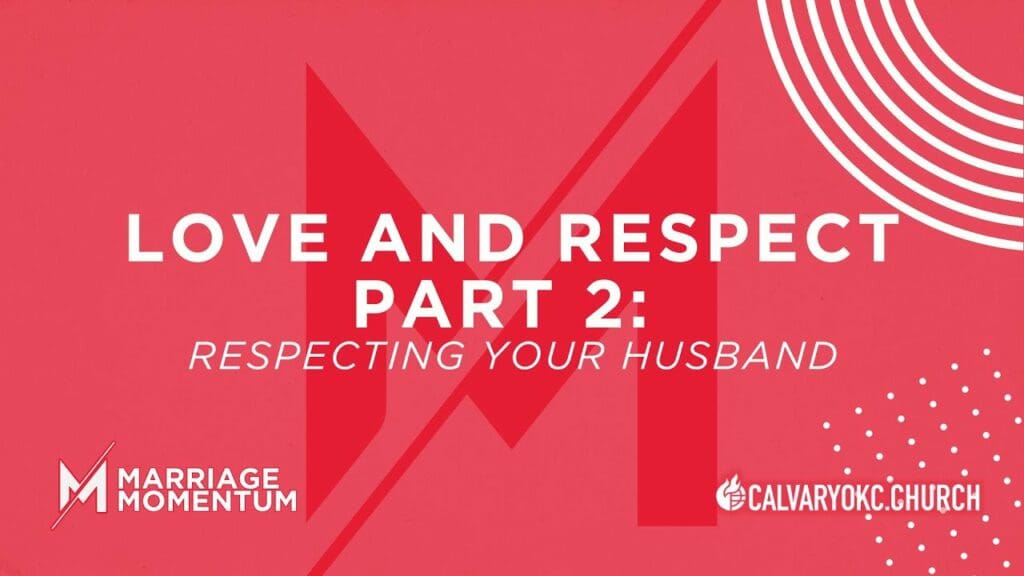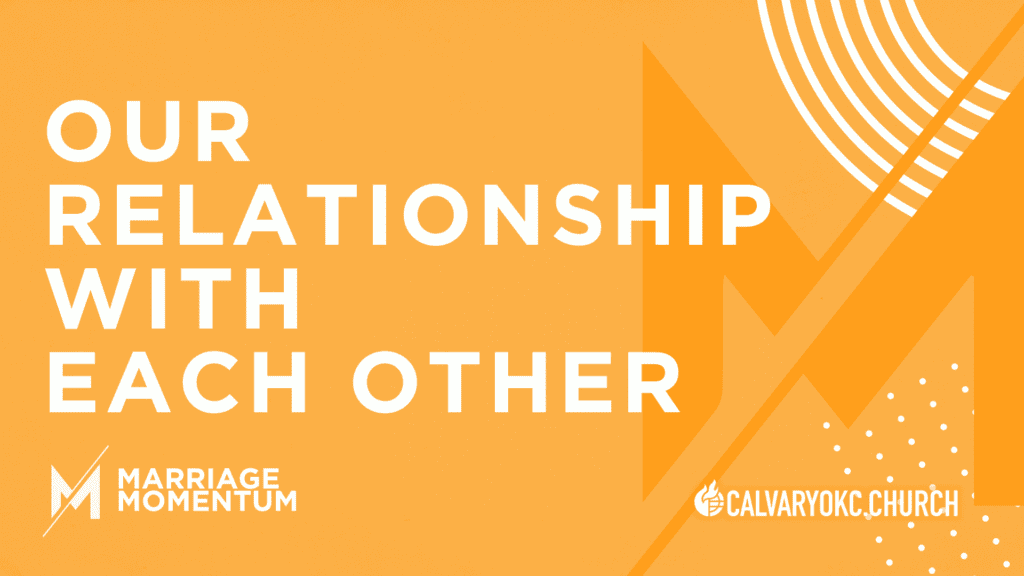More Momentum
Filter
Summary
Episode 11: The Value of Your Spouse
Marriage Momentum Podcast with Tommy & Kayla Berridge
Marriage is one of the most valuable relationships we’ll ever have—and yet it’s often the easiest one to take for granted. In this episode, Tommy and Kayla go back to the beginning to explore why God created marriage and what it really means to see your spouse through His eyes.
From the garden of Eden to the everyday moments of marriage, they unpack how God intentionally designed husbands and wives to complement one another. The differences between men and women aren’t mistakes—they’re gifts. The very traits that first drew you together are usually the ones that balance you, strengthen you, and help you fulfill a purpose bigger than yourselves.
But over time, it’s easy to forget that value. Frustration, misunderstandings, and unspoken expectations can slowly distort the way you see your spouse. When that happens, unity breaks down, communication gets harder, and marriage feels more like surviving than thriving.
Tommy and Kayla talk honestly about why this happens and how to rebuild. They dive into what Scripture teaches about headship and responsibility—not as control, but as sacrificial love, nourishment, and care. They explain how disconnection can create a kind of “paralysis” in the marriage, and how choosing to cherish each other again brings life, momentum, and healing.
This episode will help you:
-
Understand your spouse’s God-given design
-
Appreciate the differences that make your marriage stronger
-
Identify where frustration has replaced value
-
Restore unity through understanding and intentional connection
-
Reclaim the joy and purpose God intended for your relationship
You’ll also walk away with a simple, powerful challenge to help you reconnect this week.
Whether your marriage feels strong or strained, this conversation is a refreshing reminder that with Christ at the center—and with a heart to understand, cherish, and honor each other—your marriage can flourish and fulfill the purpose God designed for it.
Key Takeaways
1. Marriage Exists for a Greater Purpose
Your marriage isn’t just about comfort or compatibility. God designed it with purpose—one that can break generational cycles and release blessing for years to come. [06:26]
2. Differences Are Designed to Complement You
Men and women are intentionally different. Those differences bring balance, strength, and perspective—if you choose to value them rather than be frustrated by them. [09:52]
3. Value Is Strengthened Through Understanding
Your spouse’s worth doesn’t fade, but your awareness of it can. When you intentionally seek to understand the heart behind their actions, unity grows and frustration fades. [16:18]
4. Biblical Headship Is About Responsibility, Not Control
Christ leads by nourishing, caring, and sacrificing for His people. In marriage, that same heart is meant to flow between husband and wife. Operating independently or out of frustration disrupts the unity God intended. [21:25]
5. Treasure the Details, Not Just the Role
Healthy marriages are built by cherishing the little things—the quirks, habits, and traits that make your spouse uniquely yours. What you treasure, your heart follows. [28:53]
Share your experiences in the comments or reach out to us at marrieds@calvaryokc.church.
Five-Day Devotional
Day 1: Marriage Has a Greater Purpose Than Ourselves
Marriage is not just about companionship but about fulfilling a God-given purpose together that extends beyond personal happiness or even harmony in the home. When a husband and wife come together, they are called to accomplish something greater than themselves, impacting generations and breaking cycles that may have existed before. Investing in your relationship is not just for your benefit, but it sets a healthy example for your children and others, creating a legacy of blessing that reaches far beyond your own lives. [06:26]
Genesis 2:18 (ESV)
Then the Lord God said, “It is not good that the man should be alone; I will make him a helper fit for him.”
Reflection: What is one way you and your spouse can intentionally pursue a shared purpose this week that goes beyond your daily routines or comfort zones?
Day 2: Embracing and Valuing Our Differences
Men and women are created with distinct differences—emotionally, mentally, and even physically—but these differences are designed to complement, not divide. When we learn to value what makes our spouse unique, we move from frustration to appreciation, recognizing that the very traits that sometimes irritate us are often the ones that first attracted us. By seeking to understand rather than change each other, we build unity and strength in our marriage, allowing both partners to flourish in their God-given roles. [10:16]
1 Corinthians 12:18-20 (ESV)
But as it is, God arranged the members in the body, each one of them, as he chose. If all were a single member, where would the body be? As it is, there are many parts, yet one body.
Reflection: What is one specific difference in your spouse that you have found frustrating, and how can you choose to see and value it as a strength today?
Day 3: Headship Means Responsibility and Nourishing Love
True biblical headship is not about domination but about responsibility, sacrifice, and nurturing. Just as Christ is the head of the church and gave Himself up for her, husbands are called to nourish and cherish their wives, and wives are called to honor and support their husbands. When either partner allows frustration or pride to sever this unity, the marriage loses its ability to fulfill its purpose, much like a body cannot function when the connection between the head and body is broken. [21:25]
Ephesians 5:25-29 (ESV)
Husbands, love your wives, as Christ loved the church and gave himself up for her, that he might sanctify her, having cleansed her by the washing of water with the word, so that he might present the church to himself in splendor, without spot or wrinkle or any such thing, that she might be holy and without blemish. In the same way husbands should love their wives as their own bodies. He who loves his wife loves himself. For no one ever hated his own flesh, but nourishes and cherishes it, just as Christ does the church.
Reflection: In what practical way can you take responsibility to nourish and cherish your spouse today, even if it requires sacrifice or humility?
Day 4: Treasure Your Spouse—Your Heart Will Follow
Feelings can be fleeting, but Scripture teaches that where you invest your treasure, your heart will follow. Choosing to treasure your spouse—appreciating their quirks, strengths, and even their weaknesses—will lead your heart to deeper love and commitment. Instead of waiting for feelings to motivate you, decide to value your spouse intentionally, and watch as your affection and unity grow stronger over time. [28:53]
Matthew 6:21 (ESV)
For where your treasure is, there your heart will be also.
Reflection: What is one small, specific way you can show your spouse that you treasure them today, regardless of how you feel?
Day 5: Marriage Is About What You Pour Into It
A flourishing marriage is not about what you can get out of it, but about what you are willing to pour into it. When you put God at the center and choose to cherish, encourage, and breathe hope into your relationship, you create an environment where both partners can thrive. Remember, with Christ at the center, all things are possible—even in seasons of difficulty or discouragement. [37:53]
Philippians 2:3-4 (ESV)
Do nothing from selfish ambition or conceit, but in humility count others more significant than yourselves. Let each of you look not only to his own interests, but also to the interests of others.
Reflection: What is one selfless act you can do for your spouse this week that will pour life and hope into your marriage?
Transcript
Hey, this is Kayla, and I’m Tommy. And welcome to Marriage Momentum podcast. The goal of this podcast is to help your family flourish by making your marriage whole. Welcome to our home. We’re getting head nods.
It is extremely common in a marriage relationship to not really understand the full value of your husband or the full value of your wife, even though that is the most valuable thing that you have in life.
Yes. Set aside assets, set aside—newsflash to all the parents out there—it is more valuable than your kids. Hopefully my kids just didn’t hear me say that, you know, but truly, it is the most valuable relationship.
That’s right.
Yeah. So, to really understand the value of our spouse, I think it’s really important to go all the way back to the very beginning of time, you know, hop in our mental time machine and go back and look at why marriage was even created.
Okay.
And now, we’re not going to get super deep and philosophical here, but just really looking at the surface level. So God begins to speak things into existence, creates this world for man, for mankind to dwell in so He can have a relationship with them.
But then He looks at Adam because there’s a purpose that needs to be fulfilled after this creation. There are things that need to be done, but He looks at Adam and He says, “Man, it is not good that he should be alone,” because God’s looking at Adam, and then He’s looking at all of this that needs to get done, this huge purpose that’s set before him.
And He says, “This is a purpose far greater than he can accomplish by himself. I need to create somebody to come alongside of him and help him fulfill this purpose.”
So, do you want to—why don’t you break down what “help me” means?
When you think about it, like, okay, there’s a purpose, there’s something to be accomplished.
Right.
You know, the marriage isn’t the accomplishment. Like, that’s the start of accomplishing something greater than himself. And Adam didn’t need any help if he wasn’t supposed to do anything. He had a purpose.
Right.
And so that wife was created—Eve was created—to come alongside of him.
And so that means all of our marriages flow from that marriage from the beginning of time.
Yeah. So that means our marriage has a greater purpose than just us existing together. Each and every marriage—those of you listening to this—have a greater purpose than just existing, a greater purpose than just honestly even trying to find harmony in the home.
Like, there is a coming alongside, and I love the word that you use, that “conquering.”
Yeah.
Like, there is something to be conquered together. There is something to be achieved together.
Yes.
And that’s the thing, like even in your marriage, those little accumulations of moments to build that marriage, like understanding that building that relationship with each other is fulfilling the greater purpose.
Because what’s happening is there are people out here listening to this that are breaking generational curses by investing into your relationship. And what you’re doing is you’re forming now a relationship for other people to look at, but now your kids are able to carry on what a healthy relationship is supposed to look like.
Yes.
And that is a purpose that is now reaching far beyond your voice will ever reach.
Yes. You’re reaching into generations of blessing.
Yes. Can I say this really fast?
Go for it.
It ends with us. And that’s the thing: we can lose sight of the day-to-day purpose by looking at this big, grandiose thing that we think it’s supposed to look like. But breaking generational curses and setting forth purpose looks like pursuing purpose every day.
And so—
Right.
Going home and loving your family.
Absolutely.
And so God looks at Adam. Adam’s got a purpose, but that purpose cannot be fulfilled without Eve fully. So then marriage is created.
Now we have a beautiful thing that man has stepped in and really kind of messed up—like messed up the viewpoint of, messed up how it’s supposed to operate, all of that.
Even to the point now where people can get caught in this perpetualness of like, “Well, you know, when we were dating, it was great. But now all of a sudden, when I said ‘I do,’ why did everything all of a sudden fall apart? Why does it look like that practically?”
Well, you weren’t fulfilling a purpose other than getting to know that person when you were dating. But now when you link up together, you take that vow before God, that “till death do us part,” linking arm in arm to fulfill a purpose greater than ourselves.
Now comes in the mixing of different personalities, the different perspective of what that purpose is supposed to be fulfilled like.
Now comes in all of those things, but there’s got to be a joint purpose.
Men and women are very different. If you did not realize that, this is the podcast for you, okay? Men and women are very different.
Anatomically, emotionally, mentally, in every aspect. Even down to—I mean, I read it the other day—the reason why women typically have softer skin than men even goes down to the very makeup of how their thyroid operates.
Like, it is down to intricate details, even down to genetics, like different chromosomes, okay?
We are vastly different, but those differences were never meant to divide. They were meant to complement each other.
Yes.
God did not create man and woman to divide them together, to put us in a perpetual fight, okay? It was to complement one another in our differences.
Yes.
Okay. So, and I was thinking about this too. We were in the car and we were talking about this. And truthfully, it’s really interesting. I’m going to cap it with this and then we’re going to dive in.
It’s everything that’s not me. Like, it’s everything that’s not a man is what attracts a man to a woman.
You know, the deep personability, somebody said they’re like their authenticity of just who they are.
I think for a man, yeah, it can be without getting too deep into the sin part of it. Like, it can be just a pride. Like men have a natural pride to them.
Like, I mean, to the point where we know a little kid, you say something and he just says, “I know it.” Like, there’s just an air of confidence about them.
Okay.
And so it’s amazing when you put it out and you see that the very things that we lack is what attracts us on both sides of it.
Okay.
So that deep personability, the nurturing thing. And you even asked me, you’re like, “How does nurture—like, you had a mom.”
Yeah.
Like, what is it? What is it?
If you’ve been married for any length of time, you’ve probably heard a sense of like, uh, you know, “You probably need to drink a little more water,” or, “Oh, if your head’s hurting, like, oh, there may be something greater wrong with you.”
A man will willingly die on his own couch by himself because he just doesn’t want to go to a doctor.
Kind of, eh.
Like, kind of, okay.
But the woman is like, “What deeper is wrong?”
Okay.
But that’s the nurturing sense because she truly cares for the depths of who he is.
Okay.
And so, sure, there can be some of that mother-like peace, but I guarantee you that woman’s not looking at you longingly like your mom.
Your mom is there to just nurture you.
Okay.
Your wife is nurturing you for the fact because she loves you and she wants the best for you.
Yes.
Okay. Does that make sense?
Okay.
So that’s separating. And a lot of that goes into like everything that we were talking about kind of kept going back to it.
There is a deep belief and a hope in a woman that’s not there in a man.
Okay.
That’s why we were looking up and the statistics are kind of very wide, but you walk into really any kind of church, you’re going to see more women than men.
Yes.
Because there is a deep belief and hope in a woman for something, just something greater, something more powerful than what they are.
Okay.
Something more that exists far beyond what they even see, but they place that same belief and that hope on their husband, on their children.
There’s some kind of like—
There’s a deep hope and belief and men want that.
We see that of like, “Man, she believes in me.”
Yeah.
And I was thinking back to like times of like, you know, you would ask questions and I would take them very personal about like, “Hey, you know, are you going to work at this for the rest of your life?”
But when I realized, when I saw the value of where that was coming from—and this was years of tears.
And so that’s what we’re saying.
So this is a key point to where why our differences can be frustrating, but they’re meant to complement.
It can come through as nagging and truly sometimes it is nagging because it’s coming through filtering through frustration.
Yes.
Why is it filtering through frustration?
Because no matter how much I say something, he doesn’t value what I’m saying.
But then on the vice versa, you know, the man can be saying, “So I wish this,” you know, with this, this, this kind of throwing things out.
And it can come across very harsh or very, whatever the case is, it’s filtering through frustration.
Why?
Because he doesn’t feel like his wife’s hearing it and valuing what he has to say.
So that’s why we’re focusing on value.
Because when I learned to value the depth of where you were coming from, I could separate.
Sure. There may have been some frustration in your voice, but she’s not saying these things because she hates me.
She’s not saying these things because maybe she wants me to conform to how she is.
It’s that she wants the best for me.
And it goes back to that belief and hope.
You saw something in me that I didn’t even see.
And a lot of women see that.
That’s why they can grab a baby off of a doorstep and be like, “Oh, I will love this baby.”
And the guy’s like thinking through of like, “How much is this going to hinder my life?”
Let’s be like, we’re just being honest.
Okay.
Because she sees belief and hope in things that a man doesn’t.
And truly that’s what will draw a man.
It can frustrate a man.
But it draws a man from the very beginning.
The very things that drew us are the very things that can repel us if we don’t hold to the value of it.
And that’s going back to it.
You’re holding that Stradivarius. You’re holding something so valuable.
And when you hold it for a very long time, it can kind of lose its value.
Does it lose its value?
No.
You’re losing your perception of its value.
And so that’s what we’re trying to do is switch that.
Okay.
So we talked about what attracts a man to a woman and the value of a woman in those things. Very high level. We could spend a whole podcast on that. We’re not going to.
But now let’s talk about the man side.
Like, and you can correct me if I’m wrong.
Somebody that just has a teachable spirit.
Okay.
Yeah.
No, that’s good.
Well, okay. So talking about all this, you know, we were laying out these differences of the very reasons why men and women attract each other.
And they are the differences.
Okay.
We, and I think that was the glaring thing with this is they were the things that we don’t naturally have is what attracts us.
And that’s what adds value.
Okay.
But the more time you spend with somebody, we can take things for granted for sure.
Shifting that perspective and understanding.
Okay.
The frustration sets in when we begin to devalue something, when we don’t understand where it’s coming from.
Now we don’t understand where it’s coming from.
I think that’s the other thing too, is you don’t naturally—because we don’t think like that. We don’t operate like that.
And that’s gender neutral.
That’s man and woman.
We do not think like the opposite sex and we never will.
There is no amount of yelling, “You need to get in touch with your feminine side.” That’s going to get a man in touch with his feminine. It’s not going to happen.
Okay.
But that’s where the seeking to understand—man, we talk about that all the time.
And it really, what it is—
Perfect.
Or yes.
Yeah.
It’s figuring, and that’s where the seeking to understand.
Every word that’s spoken, there’s a deeper thing to it.
Man and woman alike.
Okay.
And so that’s where the seeking to understand, “Where is he coming from? Where is she coming from?”
That shows you truly value something.
Yes.
Okay.
Yes.
Now, what does this look like in practical terms?
Okay.
So in a marriage relationship, and we see it all the time, we’ve been victims of it ourselves.
We can begin to allow frustration to set in because we’re not viewing things the same way.
We’re not valuing things the same way.
I’m not valuing you.
You’re not valuing me.
Whatever the case is, whatever the season is.
When frustration begins to set in between a husband and a wife, the very things that attracted you are now severing the tie of unity.
Unity are severing the tie of what you were created for—a purpose together to be able to fulfill.
Yes.
Okay.
Now we are going to bring in a very practical biblical concept here that’s going to help us understand this.
Okay.
So we have Paul. Paul’s teaching it—man, just the richness and depth of Paul, honestly.
And it was all revelation from God, but he talks about Christ being the head of man, man being the head of woman.
Now, before everybody grabs their pitchfork and starts, we want to break this down for you.
Okay.
We really want to break it down because in Colossians, Paul talks about—and he’s laying out people that have rejected Christ.
Okay.
I believe it’s Colossians 2.
You want to read that?
Okay.
So in Colossians, he lays out what the head does.
And so, yes, headship.
Sure.
We have—there’s authority associated to it, but with authority—and this is the other thing too—in our human nature and in our desire, we can grab hold of authority and think, “Oh, in charge, like they’re going to do what I tell them to do.”
Sure.
There’s some kind of shaky concept of that with authority comes that.
But I think my biggest thing that we need to understand is with authority comes responsibility.
The Christ being the head, He has a tremendous amount of responsibility on Him.
Okay.
What was He responsible for?
Taking the sins of the world upon Himself that He didn’t deserve, dying for us, conquering death, hell, and the grave, and then pouring His Spirit out on us, and then nurturing and nourishing us every single day.
Yes.
Okay.
That’s a lot of responsibility.
That’s a lot of responsibility.
Okay.
Now, but in Colossians, though, it lays out the head.
The head is meant to nourish the body, a growth that can only come from God.
So we have, sure, you have authority as the head, but you have the responsibility of nourishing and feeding the body.
Okay.
Now, let’s correlate that of what it looks like in the natural, because I’m a firm believer that every spiritual teaching has a natural application.
And that’s why Paul talks about the body, the fingers, the eyes, all of these things, because there’s a physical correlation that we can talk about.
What does paralysis look like in a body?
Muscles.
So between the brain and the body, between the head and the body, paralysis.
So it’s a severing.
So husbands, when we get so frustrated with our wife not seeing things the way that we do or nagging us constantly, and instead of truly seeking to understand or embracing and valuing the differences—sure, it could be hard.
And that’s the other thing, too, is I want somebody to hear this.
If you’re trying to start fresh, headlong into a long relationship, there are going to be hard days.
There are going to be days of misunderstanding.
There are going to be snippy fights between the both of you, low blows, all of that.
It happens because we’re human.
Okay.
But when you allow the Spirit to be your guide and in love and then shifting your heart to value, “I cherish this woman more than anything on this earth. I cherish that man and I want to see him win more than anything on this earth.”
Yes.
Now what you’re doing is you’re breathing life into it.
But when we let frustration set in and we go after frustration, we sever that tie.
And what good is the head without the body?
It’s thoughts without action.
So husband, when you allow frustration to set in and you sever it, you bring paralysis to the body.
And now all it is is thoughts without the ability to accomplish purpose.
To do.
It’s a harmony.
Well, we’re severing that tie again of the unity of how the body is meant to operate.
Right.
And you said it so well of it’s not this domineering of like, “I’m going to tell her what to do and she’s just going to do it.”
And on the flip side, it’s also not, “Well, I’m the neck, and so I’m going to twist the head everywhere it needs to go.”
No, it’s operating in a unity.
You think about bringing, you know, bringing stability and strength into your body with exercise.
It’s a mental load that you’ve got to carry to break past it.
But how is it fulfilled?
It’s fulfilled through the body, which then benefits the entire body and the brain.
And I mean, there’s a whole science to fighting depression through exercise.
Oh my goodness.
Okay.
But it starts in the brain of doing it.
Then once it’s done, it benefits.
It’s a whole harmony of the whole system.
And when any side decides that it’s going to operate on its own, it completely disrupts the whole entire benefit of the body.
Okay.
So how do we value each other?
We value the differences.
So this is real quick, very quick application that’s going to help you in your marriage.
Husband, before you write it off and say, “Well, she’s just so chatty, she needs to learn to just be quiet.”
Okay.
Maybe that needs to be a conversation of when is the right time to talk, but instead of writing it off as chatty, maybe understanding the value of she’s wanting to connect to you.
Right.
Well, and on the flip side of like, “He’s so handsy, I don’t understand.”
He’s trying to connect to you.
And so I think I want this to be a revelation to somebody right now: the same feeling men—the same feeling of rejection you feel when you try to, quote unquote, “bust a move.”
Truthfully, that’s kind of diminishing it.
It’s truly trying to connect to your wife.
But the same feeling of rejection that you feel when you try to reach out and be physically intimate with her and she shuts it off is the same feeling she gets when she talks and you shut her down.
And vice versa.
When you shut her—when you shut him down, it’s the same feeling that you get when he doesn’t want to hear you talk.
So understanding the differences of connection and the value of that, have that honest conversation and understand they’re trying to connect.
Now, are there healthy boundaries for how that needs to happen?
Absolutely.
Work within it, work together with it.
And if you need help with it, come and talk to us.
How we respond to it is huge.
What we value—romance being, you know, versus being challenged, all of those things.
So, so, so wrapping this up, I heard the other day—and people, people rely on feelings.
We rely on our feelings way too much.
Now, did God give us feelings?
Absolutely.
Absolutely.
He a hundred percent gave us feelings in the image and likeness of God.
He has feelings.
We have feelings.
Okay.
But a lot of the time, what we do is we follow those feelings and we expect, “Well, I don’t feel it, so I’m not going to do it.”
Scripture doesn’t say that.
It says, “Where your treasure is, so will your heart be also.”
So what we decide to treasure—feeling or not—your heart is going to follow it.
Okay.
So we’ve got to learn to treasure our wife.
We have to learn to treasure our husband.
And not for the fact of just the husband or wife as a whole.
You treasure the intricate details, the quirks, the things that you find weird, the way she laughs, the way that he walks into a room, whatever it is.
Find those things, treasure them.
And then your heart’s going to follow.
When you begin to try to learn and understand the value, man, your heart is going to begin to flow into it.
Yeah.
Absolutely.
Absolutely.
All right.
So now it’s time for Build the Momentum.
So we’re going to challenge couples as you’re listening to this.
What we want you to do, husbands, wives, we want you to go to your spouse and ask them, “What were the characteristics of me that drew you to me?”
And we want you to write them out and discuss them with each other.
And then from there, what we want you to do is take them and remember them, think about them, and be like, “Oh my goodness, do I still do this?”
Like, discuss them together.
Not just a, “Oh, I love the way it”—no, discuss them because it’s really good hearing these things every now and then.
Yes, absolutely.
Quirky.
Yeah.
It’s more—it’s more quirky.
You’re getting better.
Classy.
No, I’m just kidding.
That’s crazy.
It’s honestly crazy.
No, that’s crazy.
Classy.
Classy.
That’s quirky.
It’s quirky.
Yeah.
Quirky.
You need to learn to relax a little bit.
Hold on.
Is it your kid?
Okay, if you’re laughing about your own kid misbehaving in a public setting.
No, for sure.
I’m not saying that.
But like, okay, picture this.
They throw themselves on the ground at Walmart and start kicking and screaming because you won’t buy the toy.
I feel like anybody that could willingly look at that—
Okay, but I’m picturing like, you’re like, “Ha ha ha, oh my goodness, look at Johnny.”
Like, that would—that’s crazy.
I was thinking like humorous, like, “Oh my goodness, this is hilarious.”
As long as you deal with it.
I guess I’m thinking like they don’t deal with it.
Yeah.
No, it needs the good, right temperature to be able to drink it.
No, hot—listen, hot coffee when it burns your mouth is not enjoyable.
Yeah, because you just burned your taste buds off and now you can’t taste your coffee.
It needs to cool to a good temp, a good classy temp that you can sip it and you can just enjoy it.
Classy.
It’s quirky.
That one’s quirky.
I do it.
I buy a latte from somewhere, I’m going to stir it before I drink it.
Even if I saw them stir it, I will stir it.
I ask for a stir stick and she stirs my coffee.
But it’s crazy probably.
I feel about that one.
Is normal an option?
Yeah.
Okay.
Okay.
I get it.
Okay.
I’d say quirky.
But I feel like you pull most of everybody like our age.
We just drink coffee.
Ew.
I’m trying to channel my Gen Z.
I don’t know.
Gen Z, if you’re out there, hit us up in the comments.
Work emails?
I’m going to say quirky.
Quirky.
Just say face.
Kristen, we need you to respond.
I mean, I think you do need a time of separation.
Classy.
Because you can’t—
Listen, if you’re driving, this one’s personal to me.
If you’re driving and you like putting sauce on whatever you bought, it’s really hard to put sauce on it while you’re driving.
I would rather be able to sit down.
Listen, I’m the guy that if I’m going somewhere, I’m by myself, I pull through, drive through, I will pull into the parking lot and I will eat it before I drive again.
That’s crazy.
Because I want to sit and enjoy it.
No.
Pinky out eating those chicken strips.
No.
Oh, classy.
Well, thank y’all.
Thank y’all for joining in with us.
We pray that your marriage is blessed and your marriage will be blessed.
Put God in the middle of it.
Just smack in the middle of it and go after Him.
Learn to cherish your spouse and just breathe life into your relationship.
Begin to breathe hope into it and know with Christ, all things are possible.
All things are possible.
It’s possible.
We love you guys.
We appreciate y’all.
And remember, marriage is not about what you can get out of it.
It’s what you can pour into it.
God bless.
Marriage Momentum Podcast is a ministry of Calvary OKC.















